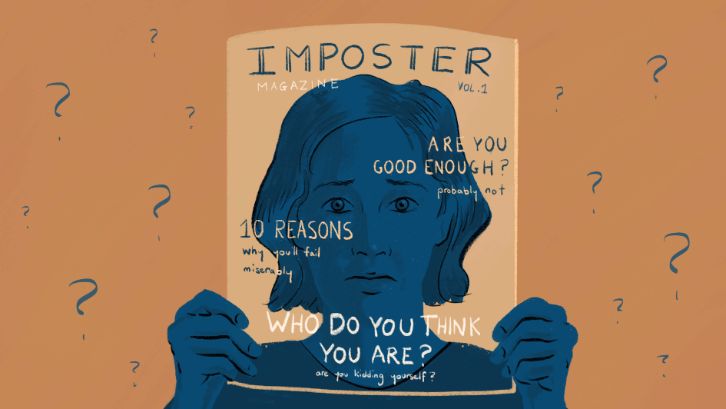“ Chris and his colleagues were professional, fun, and very informative. My students thoroughly enjoyed their visit! ”
THUMP! THUMP! THUMP! I pounded the wooden door of my parents’ room. Mom rushed to me, startled
“What is the matter!?”
“I got the Award from UBC!! I got it! I’m going to Canada!!”
I never screamed as loud ever since that one kid in class stole my bag of fruit jelly… To my family, that was the craziest day. To me, attending UBC as an International Scholar was the craziest daydream.
Yet, I soon got lost in a familiar train of thoughts:
“Do I really deserve this?”
“Did they mistake my name with another nominee and will soon withdraw the offer?”
“Other nominees must be much better than me, why would they give this to me?”
I) What Is Imposter Syndrome?

Imposter/impostor syndrome (first coined in 1978) is a psychological phenomenon in which one believes their success is due to pure luck or them deceiving others, rather than their competence and hard work. Imposters doubt their achievements and have a constant fear of being exposed as a "fraud". Imposter syndrome does not necessarily equate to low self-esteem, but people experiencing imposter thoughts are convinced that they frequently give the impression that they are more capable than they actually are. Today, imposter syndrome can apply to anyone who cannot internalize or enjoy their own accomplishments. [1] [2] [3]
Here is an imposter syndrome diagnostic test by Pauline Rose Clance that I highly recommend.
II) My Imposter Story
It was not until I started writing this blog did I sit down and reflect on the roots of my imposter syndrome (which I recommend you do too!). It must have started in high school where I majored in Chemistry at a prestigious institution. I only joined the class from the 2nd year after being allowed by the Department Head (I didn’t score high enough to directly get into the class).

Though my performance was strong, I never felt like I was one of my peers, but someone who got into the class from the backdoor. Like a thief breaking into someone’s home. I spent my next 2 years in the class thinking that I was not worthy, that I was a fake, trying to be someone I’m not. Back then, I could not label my feelings.
Things only got worse when I failed the entrance exam to NUS (Singapore) in my senior year – even though I worked so hard and my Physics teacher even said: “I have no trust in the other students. They’re distracted and not hard-working. But I believe in you!”. I felt like a disappointment. My days then were all black. After that, I gave up on the ambition of studying abroad forever, thinking that I simply was not good enough, no matter how hard I try.
Now, I am in a much better place. I am proud to say that my last year at a local university saw profound transformations. Leaving high school, I somehow managed to get back on my feet and work passionately towards my goals. I co-authored 3 scientific papers, won a tech-startup competition with my incredible team, and got into Top 100 of the largest startup competition in Vietnam.
The summer after I have achieved all that, I saw my imposter syndrome getting worse and worse by the minute. My memory of the past, feeling like a fake in my own class and a disappointment in my senior year, came back vividly, haunting my worst days.
I struggled to find help. Not until I knew there was a term for my condition – imposter syndrome – and that it was common in our world did I find some relief and a way out. But imposter syndrome never truly went away. As I prepare to join UBC, those feelings still pop up from time to time. Yet, I now look at it in a different, more flattering light. So I sit down, open my laptop, write my story, to convince you the same.
III) You're Not Alone
Do you sometimes feel like a fraud with all those A+?
Do you strangely feel unworthy of your awards and achievements?
Do you say these things to yourself?
- “I don’t deserve this”
- “Others are better, why would they give it to me?”
- “I am not who people think I am, not as intelligent, not as hardworking”
- “I’m such a fake”
Imposter syndrome, most of the time, is irrational at its core. Your head will always find an interpretation in which you don’t deserve what you earned, despite people’s best attempt to convince you otherwise. The pattern is simple: the more you achieve, the less deserving you feel. And it happens to everyone at some point (and is not necessarily a bad thing, as I will cover in the following sections). That said, some of you, like me, might experience imposter syndrome on a more severe level (due to several factors - like personality traits).
Knowing that you’re absolutely not alone, labelling your feelings, and practicing self-compassion are the first steps towards converting imposter syndrome into power!
IV) Navigating Imposter Syndrome
Over the last 15 months, I discovered some measures that had helped me turn my imposter syndrome around. These can be internal (e.g., minding your thoughts) or external (e.g., talking to someone, seeking professional help). Since each of us is unique, the measures listed below might not work as well for you as they did for me. This is not an exhaustive list, but it is a good place to start thinking about your strategies to navigate imposter syndrome in your everyday life.
1) Mind your self-talk
My anecdote: Two months after our team won the startup competition, I was invited to speak in a livestream session hosted by the university. It was not at all appealing to me as I was still struggling with imposter syndrome. My head said “You don’t deserve to be here! What if people find out that you’re a fake!?” I didn’t even dare to say hi to the Vice-Dean (yes, it was that bad). As he walked in, I immediately ran to the restroom. There, I splashed water over my face and stared into the mirror. I felt so sick of my thoughts. Then, I spoke to myself: “You know what? I can never change how people think of me (a fraud? Fine!), but I can always change how I think of myself!!”. Getting out, I gave him the biggest shout out/hi/greet he’d ever heard in his life, which made him jump a little. After the session, he told me that he was so impressed by how mature my communication was! Suddenly, everything was fine! The best I felt in months. That event kick-started a chain of realizations that soon turned my imposter syndrome around.

The lesson: In reality, you can never ever control how others see you, no matter how hard you try. Proving that you’re not a fraud to someone who always disbelieves you is pointless. What left is how you see yourself. It makes you. Change your language, hug yourself - and know that, whatever happens, you believe in you!
Taking action: Keep a journal to record your thoughts whenever you feel lost. This helps you be more aware of the way you speak to yourself. OR, if you’re like me and are lazy to write, use your phone recorder instead. (It is just as effective!)
You may write/say something like: “I notice that I’m thinking that I’m not worthy of (…) This feeling is due to (…) However, the more realistic interpretation is (…)” – The key is to distance yourself from the unhelpful self-talk. This is called self-awareness, a pride endowment of humans.[4] Seeing yourself in third-person can help you navigate your thoughts with clarity.
2) Know when your head is making stuff up

My anecdote: The first few weeks after winning the startup competition, I felt like a disappointment. Because I still found it hard to perform certain tasks, still sucked at networking, and still was not 100% motivated to continue the project. Mr. H, the last year winner who I met in the first round, was an incredible person, at ease in everything he did, and not shy to network – overall, a perfect entrepreneur. Look at me? I wasn’t that. I must be a fraud!
However, I soon learned that, apparently, Mr. H struggled too – to find a good team, to perfect his networking skills and was definitely not at ease in everything he did. He was once in my shoes, but I never saw him as a fraud (in fact, I couldn’t admire him enough). So why did I see myself as one? My head was deceiving me the whole time! I simply was not quite there yet! But with dedication, I would embark on my own journey, just as he did! (you can slowly sense how imposter syndrome can be turned into motivation!)
The lesson: It is awing how effortless we can fool ourselves. Imposter syndrome comes from mindless comparisons to someone who was previously in your place or has achieved the same. This someone can also be a totally fictional figure that you make up in the immense effort of talking yourself down. You think about how they would be like and realize that you must be a fraud because you’re not at all like that. Most of the time, that person should have experienced the same as you (or, your imaginative figure is completely non-existent). The subtle lies our mind tells us everyday don’t matter at first, but they stack up fast. Navigating imposter syndrome often means being conscious of all your unrealistic interpretations.
Taking action: When it comes to flagging the lies of your mind, I love this technique from Dr. Daniel Amen. When an unhealthy thought pops up in your head, ask yourself these 4 questions in order:
- Is it true? (Is the thought true?)
- Can I absolutely know that it is true?
- How do I react when I think that thought?
- Who would I be without that thought? Or, how would I feel if I didn’t have that thought?[5]
Most of the time, the opposite of an unhealthy/unrealistic thought is much more likely to be true. The bottom line: you thinking about the Earth colliding with a planet full of intelligent kittens doesn’t mean it gonna happen.
3) Share your story with someone

One can never underestimate the power of vulnerability. We heal and form meaningful connections with those around us by being genuine and sincere. By openly sharing our struggle, we’re celebrating the human conditions, not running from it.
That is why I decided to write this blog: I want to reach out and convince you all that we’re in this together. Remember that help can sometimes come from someone unexpected. So, if you believe that someone is accountable (doesn’t have to be your 10-year best friend), don’t be afraid to share your story – chances are they’ve experienced it too!. Why? Because we’re only human.
Taking action:
- Reach out to somebody now (can be a family member, an old friend, your bestie, your teacher… or a new friend who is notorious for being understanding!)
- Share your story with genuity & listen to theirs with empathy (the latter is arguably more important)
- Ask about their experience. How did they cope with imposter syndrome in their life?
- Politely ask if they can help keep you accountable and message them whenever the syndrome pops up.
4) Educate yourself on imposter syndrome

As you start developing a coping plan, it is also helpful to delve into the ongoing conversation regarding imposter syndrome. A better understanding of the syndrome – its science and effects on well-being – can facilitate the healing process. The anecdotes of people from all walks of life will prove that imposter syndrome affects even the best of us. Knowing that the syndrome is part of the everyday life of many high-achieving students, CEOs, and established figures, you will look at your situation in a more deliberating light. (Note: this is not to say imposter syndrome is an indicator of success!)
Taking action: These are the resources that have helped me learn more about and cope with imposter syndrome (along with some new ones I just found!).
- Web Articles
- YouTube videos
- Podcasts
- Songs - Music is my best friend during tough times, and I believe it can be yours as well! These are some of my favourites to unwind (welcome to my playlist!):
- You Will Be Found – Dear Evan Hansen
- I’m Moana (Song of the Ancestors) – Rachel House (Disney “Moana”)
- In My Blood – Shawn Mendes
- (Just a) Simple Sponge – Ethan Slater (SpongeBob SquarePants the Musical)
- When Your Feet Don’t Touch The Ground – Matthew Morrison
(I decided not to list formal research papers since they are quite heavy to absorb. There are many articles online from trusted sources like HBR in which the author already consolidated the findings from research. However, if you are particularly curious, feel free to find and delve into some!)
5) Seek professional help
If you have tried to navigate the feelings on your own but nothing seems to work, it might be time to seek professional help. Severe imposter syndrome can lead to stress, anxiety, and depression, so it is crucial that you proactively upkeep your well-being. Depending on where you are, there will be different resrouces and services available to you, but all are helpful. Some of the most common services professionals to approach are: therapists/psychiatrists/psycologists, school counsellors, and primary health care providers.
If you are/will be studying in Canada, check out this great article from Canadian Living for “Where To Find Mental Health Support In Canada” (by Tara MacInnis)
Taking action: Remember: reaching out shows courage! We tend to feel embarrassed when sharing our struggle with a stranger. But you should know that these professionals are there to help and they are, in my experience, the nicest people you can find on planet Earth! (don’t take my words for it, try speaking to one yourself!). The bottom line is: you must NEVER assume they cannot help your situation get better!
“But when we push aside normal emotions to embrace false positivity, we lose our capacity to develop skills to deal with the world as it is, not as we wish it to be.” – Susan David
V) Turning It Into Power
Just like stress, sadness, or disappointment – imposter syndrome isn’t going anywhere soon, but to avoid all negative feelings is to succumb to false positivity, unsustainable and fragile. Only when I treasured my feelings (both positive & negative) for what they were rather than what I wanted them to be did I find the power to turn things around and convert imposter syndrome into reflection and motivation. Imposter feelings can arise as you reach certain milestones in your (study) life – e.g., getting into a top university or landing a prestigious internship. With the right mindset and strategies, we can turn imposter syndrome into a lifelong powerhouse!
1) Imposter syndrome as an agent for personal growth

Imposter syndrome often stems from the belief/realization that some of your attributes (e.g., habits, work ethic, communication) might not align with someone in your position. Although these beliefs might be somewhat distorted, just having them all the time is a good signal that there are things about yourself that you can improve. For instance, imposter syndrome will start knocking whenever I spend too much time on YouTube – “You know, people will look at your achievements and assume that you are hardworking, right?” and I then have this incredible push to jump back to work. Imposter syndrome in moderation is an incredible drive for personal development and adjustment as you always find new ways to reinvent yourself. Note: realizing your room for improvement is to acknowledge your potential, not to talk down on your current capabilities!
Action: The next time imposter syndrome knocks on your door, don’t flee. Listen and treasure the feelings, filter out the noises, and recognize its guidance. Ask yourself: “Which part of what I’m thinking is just nonsense? Which part might be true and is pointing out my next self-development?”
2) Imposter syndrome as a measure for self-check
Having chronic imposter syndrome is not pleasant. But there is something much much worst. Remember that condescending guy who always boasts about how awesome and talented he is? Yeah, no one has lunch with him. With a low level of imposter syndrome in your life, you become more aware of who you are, where you want to be, and what you can improve to get there! Imposter syndrome does a great job keeping you from becoming self-indulgent and overconfident! Humility born from a tad bit of imposter syndrome can benefit you in the long run! Note: there is a fine line between humility and self-doubt. Before tapping into the usefulness of imposter syndrome, you must filter out the noises first (with the coping strategies in the previous sections)!
Action: Say thanks to imposter syndrome every once in a while! Keep in mind that this psychological phenomenon is helping you become more self-aware by reflecting on how you stand among others, which saves you from the trap of overconfidence.
3) Imposter syndrome as a teacher

Navigating imposter syndrome teaches us how to see our nature through the eyes of others and realize how different that can be from our self-portrait. In my experience, knowing how to view myself from multiple perspectives has helped me enhance my interpersonal and leadership skills. Imposter syndrome, then, can lead to deeper connections with those around us as we are constantly aware of how they too can identify themselves differently. For me, after my imposter syndrome “climax”, I became a better listener! I can now sense my friends’ sadness or struggle even if they try to fake it from the world :)
Action: In previous sections, you’ve learned to cope with imposter syndrome by comparing how you see you to how others see you. Now, let’s go a step further! Try applying that strategy to many other aspects of your social/work/study life as well. For example, you believe your actions and talks are motivating and caring to your teammate, but take a step back and look at you from another’s eyes. Ask yourself: do I appear to others as I think I do?
VI) Final Words From Me - An Avid Imposter
Just like any other essential emotions of humans (like happiness or sadness), imposter syndrome comes and goes, but it never disappears. I believe the word “syndrome” has led many to think that their imposter feelings is a disease that needs to be cured. That is not true. Think about sadness or disappointment – they also happen to everyone and much of them will also affect your well-being. So, changing the way we look at imposter syndrome from an undesirable condition to an everyday emotion is the first step to effective navigation and unleashing its true power!
I hope this blog has been helpful to you as you learn more about what imposter syndrome is, how to navigate the feelings, and acknowledge how it can facilitate your personal growth. Remember: you’re never alone! Ever! And if you want to talk to someone about imposter syndrome (or anything else in life!), just shoot an email to [email protected]. I am always here – for you!
References
-
Corkindale, Gill. "Overcoming Imposter Syndrome" Harvard Business Review, 07 May 2008, https://hbr.org/2008/05/overcoming-imposter-syndrome
-
Abrams, Abigail. "Yes, Impostor Syndrome Is Real. Here's How to Deal With It" Time, 20 June 2018, https://time.com/5312483/how-to-deal-with-impostor-syndrome/
-
"Impostor syndrome" Wikipedia. Wikimedia Foundation, https://en.wikipedia.org/wiki/Impostor_syndrome Accessed 29 August 2020.
-
Covey, S. R. (2005). The 7 habits of highly effective people. London: Simon & Schuster.
-
“4 Questions to transform your thinking and lift your mood”. BrainMD, 26 Feb 2015, https://brainmd.com/blog/4-questions-to-transform-your-thinking-and-lift-your-mood/ Accessed 29 August 2020.



